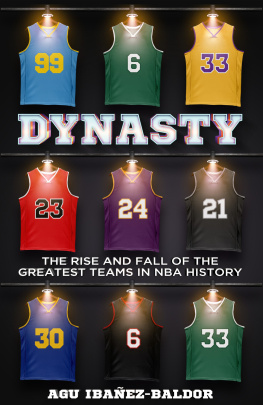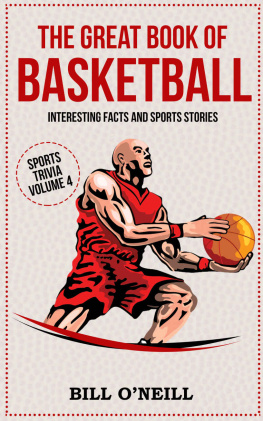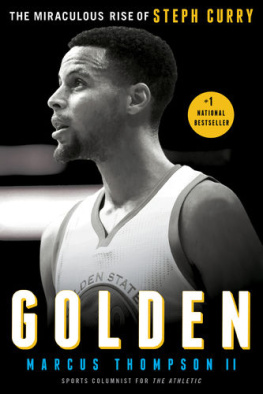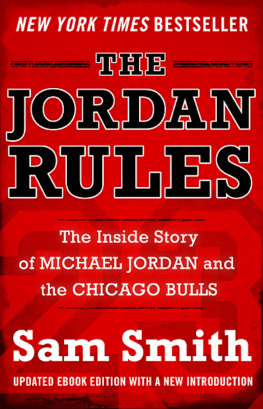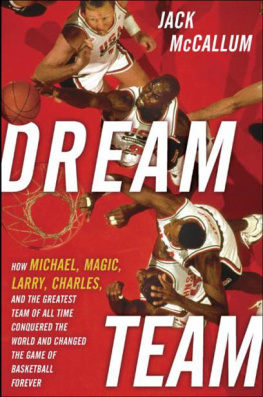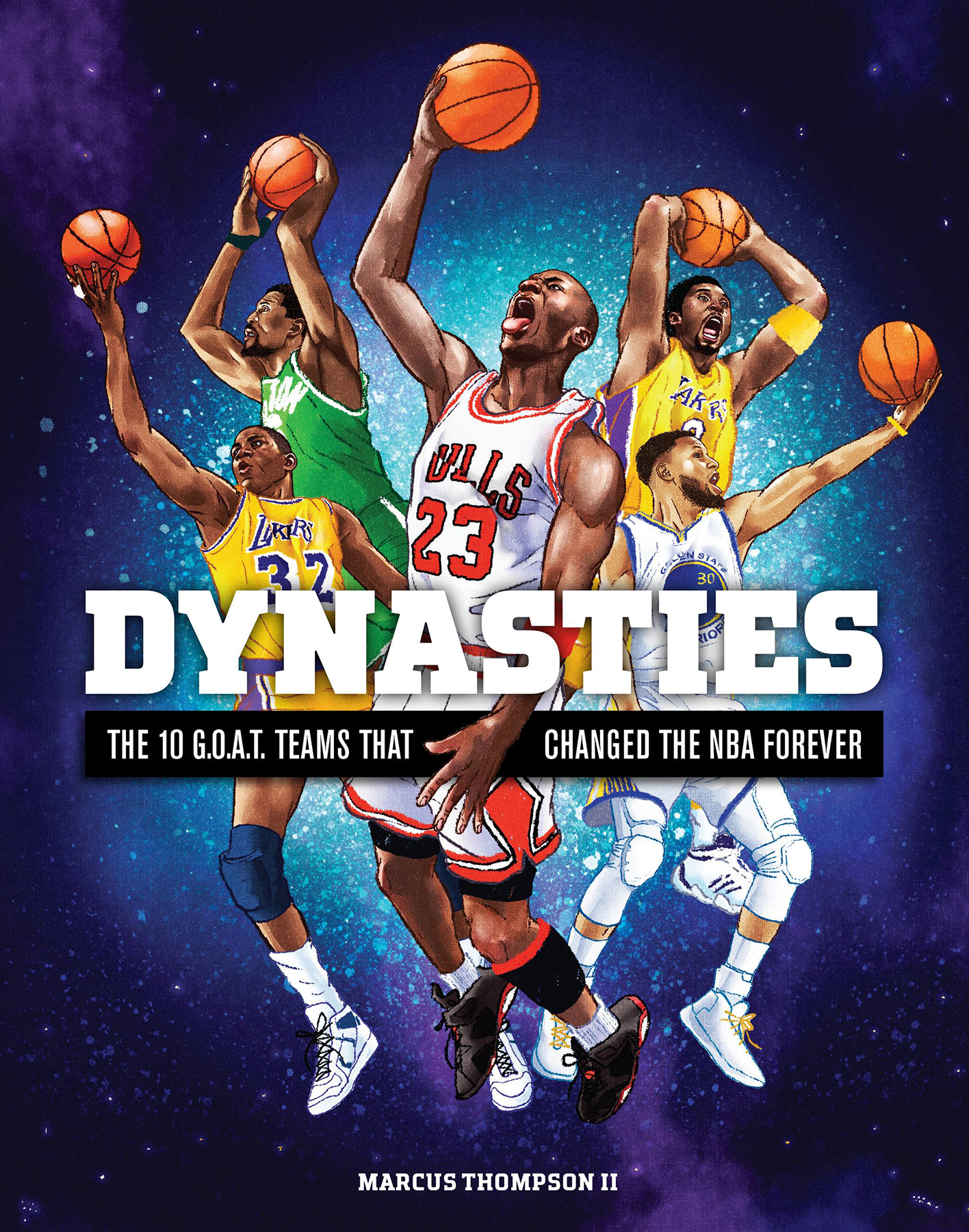
Any third-party brand names, trademarks, or logos used in this book are the property of their respective owners. The owners of these brands, trademarks or logos have not endorsed, authorized, or sponsored this book.
Text copyright 2021 by Marcus Thompson II
Illustrations copyright 2021 by Yu-Ming Huang
Jacket design by Katie Benezra
Jacket copyright 2021 by Hachette Book Group, Inc.
Hachette Book Group supports the right to free expression and the value of copyright. The purpose of copyright is to encourage writers and artists to produce the creative works that enrich our culture.
The scanning, uploading, and distribution of this book without permission is a theft of the authors intellectual property. If you would like permission to use material from the book (other than for review purposes), please contact permissions@hbgusa.com. Thank you for your support of the authors rights.
Black Dog & Leventhal Publishers
Hachette Book Group
1290 Avenue of the Americas
New York, NY 10104
www.hachettebookgroup.com
www.blackdogandleventhal.com
First edition: October 2021
Black Dog & Leventhal Publishers is an imprint of Perseus Books, LLC, a subsidiary of Hachette Book Group, Inc. The Black Dog & Leventhal Publishers name and logo are trademarks of Hachette Book Group, Inc.
The publisher is not responsible for websites (or their content) that are not owned by the publisher.
The Hachette Speakers Bureau provides a wide range of authors for speaking events. To find out more, go to www.HachetteSpeakersBureau.com or call (866) 376-6591.
Library of Congress Cataloging-in-Publication Data
Names: Thompson, Marcus, II, 1977 author.
Title: Dynasties: the 10 G.O.A.T. NBA teams that changed the NBA forever / Marcus Thompson II.
Description: First edition. | New York, NY: Black Dog & Leventhal, 2021. | Includes index. | Summary: Acclaimed sports journalist Marcus Thompson explores the 10 teams that transformed basketball in this illustrated history of the sportProvided by publisher.
Identifiers: LCCN 2020046460 (print) | LCCN 2020046461 (ebook) | ISBN 9780762496297 (hardcover) | ISBN 9780762496280 (ebook)
Subjects: LCSH: National Basketball AssociationHistory. | Basketball teamsUnited StatesHistory. | Basketball playersUnited StatesBiography.
Classification: LCC GV885.515.N37 T55 2021 (print) | LCC GV885.515.N37 (ebook) | DDC 796.323/640973dc23
LC record available at https://lccn.loc.gov/2020046460
LC ebook record available at https://lccn.loc.gov/2020046461
ISBNs: 978-0-7624-9629-7 (hardcover); 978-0-7624-9628-0 (ebook)
E3-20210825-JV-NF-ORI
To my favorite little girl in the whole wide world.
You are an array of brilliant colors, making life more vivid. You are the rhythm behind my most random dance. You are the warmth in my laugh, the happiness healing my jadedness. You are the perfect princess.
T he NBAs special sauce is hatred. Its like a dollop of sour cream in pound cake batter, or a pinch of cayenne pepper in a latte.
What? Youve never spiced up your joe?
Thats what hate is for the NBA. Spice. Admittedly, it might sound ridiculous. People love sports. Heart-in-place-of-the-o kind of love. They love their teams. They love the players. They love the games, watching them and playing them. Sports is such a huge industry and so central to American culture because people absolutely love it. They live for it, watch it constantly, talk about it incessantly, dream about it, spend what amounts to the price of a new car on season tickets. This is especially true with the NBA. One of the leagues most memorable marketing ploys was the I Love This Game campaign that ran from 1992 to 1999. Commercials filled with game highlights and fans having a blast were punctuated with celebrities declaring, I love this game! Love propelled the NBA, it would seem. People get team logos tattooed on their calves and have players likenesses shaved into the backs of their heads by barber artists. They wear hoop jerseys with pride despite revealing hairy shoulders or side boob. They get married at center court during halftime. All for the love of the game.
Yes, love is at the core of fandom, and people across the world love the NBA. But love alone didnt elevate the league over the last forty years from an afterthought in Americas psyche to a sports behemoth with the kind of magnetism that can supplant politics as the lead story. It wasnt love alone that pushed the NBA into the mainstream, past baseball in the hearts of many Americans, and made it popular enough to make the NFL pay attention. Love alone is not why the NBAs biggest stars are among the most well-known celebrities in the world.
In the realm of sports, love is a metaphor for passion. A strong accelerant for that passion is hate. Yes. Hate is how the NBA and its story lines grow from a warm campfire enjoyed among hoop heads to a consuming blaze infiltrating society. Hate helps expand the NBAs reach past that of diehards and into the curiosity of those who prefer binge-watching Ozark but cant escape the NBA buzz.
Lets explain a little further.
Hate is not exactly hate in this context. It has become more of an umbrella word used to encompass a host of negative feelings. Dislike. Disrespect. Animosity. Or just good ol-fashioned jealousy. All of that fits under hatehyperbole for the antagonistic component of fandom. Generally speaking, to be sure. Because sometimes it is actual hate. The real stuff. But that is usually masked, often poorly, behind acceptable sports animus. (More on that later.) In this sense, were talking about the you hatin version of hate. The kind that prompts yelling at the television until the foam builds in the corners of the mouth. The kind that triggers frantic all-caps typing in an argument with a stranger on social media. The kind that finds more joy in ridiculing the loser of the game than celebrating its victor. When the hate rises, clashing with the aforementioned love, it creates a duality that explodes interest.
Look at your fists. If you can envision the brass knuckles of Radio Raheem from Do the Right Thing (played by the late Bill Nunn) with LOVE on the right hand and HATE on the left, you are the coolest person reading this.
Its akin to the Howard Stern Effect, unofficially coined for the radio personality in the 1990s. In his prime, most of his listeners were people who couldnt stand him. They disliked him so much they couldnt help but tune in to the shock jock so he could fuel their rage. They wanted more reasons to clutch their pearls and gasp in horror. So he had those who loved him listening as well as those who hated him, making him incredibly popular. The same happens in the NBA. And when the love is so strong, eventually it spawns hate. And as the hate rises, a phenomenon is created worthy of national attention. Both sides become so consumed, so invested, that casual fans cant help but be drawn in for the spectacle.
Its magnified when the hate is among the players. When the country was locked down in the spring of 2020 due to the COVID-19 pandemic, the airing of the ESPN documentary The Last Dance was pushed up two months to April 2020. In the second weekend of the five-week, ten-episode showing, the excitement was really turned up when it covered the rivalry of Michael Jordans Bulls and Isiah Thomass Pistons from the late 80s and early 90s. Just seeing Jordans disdain for Thomas, still after thirty years, instantly reignited the Pistons-Bulls enmity.


